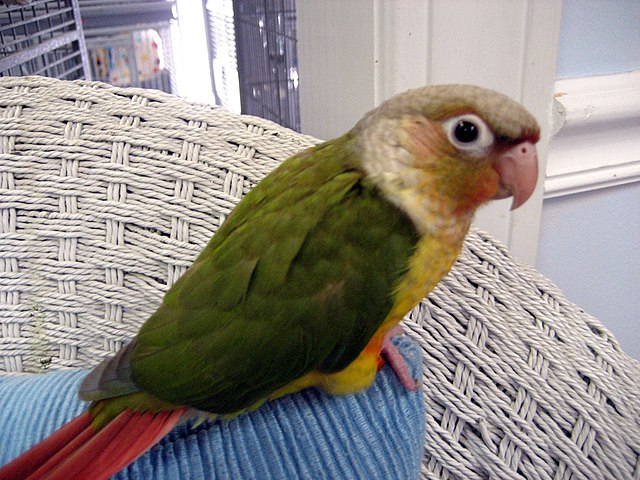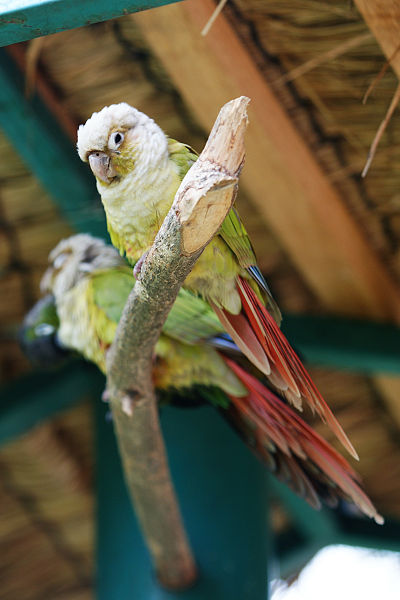Most Green Cheek Conure parrots are healthy, hardy birds. Well cared for and fed a balanced diet, they are amazingly resilient to disease and don’t often get sick.
As with all parrots, signs of illness in Green Cheek Conures are ruffled plumage, resting often with their head tucked under their wing, poor appetite, discharge from the nostrils or mouth, cloudy eyes, loose stools, weight loss, increased water intake, labored breathing, and listlessness.
If you notice any of the above symptoms, take your Conure to an avian veterinarian. They will conduct thorough testing to determine the cause.
In addition to being hardy birds, Green Cheek Conures are generally well-behaved. That being said, there are some common behavior problems owners typically deal with.

They include biting – especially during sexual maturity, screaming, and feather plucking.
While most Conures are typically very noisy birds and may not be appropriate for people living in apartments or in housing with thin, shared walls, the Green Cheek Conure is among the quietest of the breed. If they’re trained and socialized from a young age, screaming may not be an issue.
Additionally, the Green Cheek Conure is a chewer and a mischief maker. While you can curb this habit by providing appropriate toys for them to chew on, be prepared to find clothes and furniture in less than optimal condition. Never leave them alone or you’ll return to a few surprises, guaranteed!
To eliminate or prevent behaviors like biting or screaming, begin training them from a young age. They haven’t had the time to develop any bad habits. Additionally, young Conures are generally not aggressive which makes it easier to train them without worrying about losing a finger.
Bonding with your Green Cheek Conure is an important part of the training process. If your lovely little Green Cheek doesn’t trust you, you’re going to struggle through every step of every training session.
To get you’re young or new parrot to trust you, move slowly, talk softly, and be patient. Trust isn’t earned and then kept for life. Trust can be lost. Never mistreat your Green Cheek, you’ll not only lose their trust, but they’ll also become more aggressive and loud.

Never hit, scream, or yell, hold his beak, give the bird a time out, spray with water as a punishment, or ignore in an attempt to change their behavior. When you exhibit these negative behaviors whether you’re involved in Conure training or simply interacting with your bird, you’re breaking trust with your bird.
This behavior will give you the absolute opposite results that you desire and you’ll likely encourage more bad behavior in your bird. Of course, this isn’t what you want to do!
Your Green Cheek is a loving, loyal, and intelligent bird. They’re quick learners and love to receive verbal and physical praise from their beloved owners. Training sessions should be fun for both of you.
If your Green Cheek is biting, pulling out its feathers, or screaming trick training is most certainly the best approach. It is also important to eliminate the causes of the behavior.
For example, if your bird is acting out because they’re bored, then part of the solution is to provide them with toys and activities outside of the cage to keep their minds busy and entertained. If your Green Cheek is stressed out because the cat is always sitting in their cage, find a way to keep the cat off of the cage!
Green Cheeks are generally wonderfully behaved and hardy birds. Care for them well, take them to the avian veterinarian regularly and they’ll live out a long and healthy life. Socialize them and train them early and behavior problems will be minimal if any.
